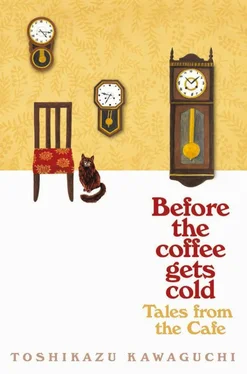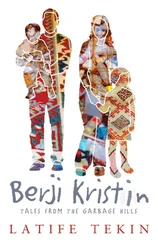These words come alive in the Japanese comics of today, where they appear directly over the illustrations outside the caption bubbles. When a character strikes a dramatic pose, ZUBAAN! is added for emphasis, or DOHN! is added to intensify the crashing of a heavy object. Sulu-sulu adds texture to a slippery surface, and the quality of silence is encapsulated by shi – n . When these comics use glyphs in this way, it heightens the reality of the moment.
There is a song often sung in school music classes that is full of these expressions.
I can hear the pine cricket chirp!
Chin-chillo chin-chillo chin-chillo-lin
I can hear the bell cricket chirp!
Lin-lin lin-lin li – n-lin.
One autumn evening…
Miki Tokita was singing this song, ‘Harmony of the Insects’, in a loud spirited voice. She was keen for her father, Nagare Tokita, to listen to the song she had learned at school that day. And all her singing was making her face quite red.
Nagare was struggling to continue to listen to Miki’s out-of-key and very loud notes. A deep furrow was forming in the middle of his forehead, and his mouth was fast resembling an upside-down ‘U’.
‘ Chirping throughout the long autumn night.
Oh, what fun to hear this insect symphony! ’
When she finished singing, Miki was met with applause. ‘Wonderful, wonderful,’ said Kyoko Kijima, clapping her hands. Kyoko’s praise left her smiling with a smug sense of achievement.
‘ I can hear the pine cricket…’ she started singing again.
‘All right, Miki. Very nice, but enough!’ said Nagare, desperate to stop her song. Having heard it three times already, he was well and truly sick of it. ‘Thank you for sharing your song, now go and put your randoseru away,’ he said, picking up her school bag from the counter and holding it out to her.
Miki, still gloating from Kyoko’s praise, said, ‘OK,’ and disappeared into the back room.
‘ Chin-chillo chin-chillo chin-chillo-lin…’
Just as the singing Miki left the room, the cafe’s waitress Kazu Tokita appeared. ‘Well, it certainly feels like autumn has arrived,’ she muttered to Kyoko. Miki’s singing had apparently heralded autumn’s arrival in the cafe, which always looked the same, regardless of the season.
CLANG-DONG
Entering the cafe as the bell rang out was Kiyoshi Manda, a homicide detective at Kanda Police Station who was around sixty. It was early October, and the mornings were beginning to get quite chilly. Kiyoshi removed his trench coat and sat down at the table closest to the entrance.
‘Hello, welcome,’ said Kazu as she served him a glass of water.
‘Coffee, please,’ Kiyoshi replied.
‘Coming straight up,’ Nagare said from behind the counter, and popped into the kitchen.
When Nagare had gone, Kyoko whispered so that only Kazu could hear, ‘Kazu, the other day, I saw you walking in the front of the station with a man! Who was that? You don’t have a boyfriend, do you?’
Smiling mischievously with a playful sparkle in her eyes, Kyoko was no doubt waiting for Kazu to react in some way rarely seen – to blush, or something similar.
But she simply looked Kyoko in the face and replied, ‘Yes, I do.’
Kyoko looked genuinely surprised.
‘Really? I didn’t know you had a boyfriend!’ she bellowed, leaning closer to Kazu standing behind the counter.
‘Well, I do.’
‘When did this happen?’
‘He was a senior student while I was at art school.’
‘You mean you’ve been dating for ten years?’
‘Oh, no. We’ve been dating since spring.’
‘Spring this year?’
‘Yes.’
‘Oh, really?’ mused Kyoko, leaning back in her seat until she was precariously close to losing her balance. She let out an enormous sigh.
Of the people in the cafe, however, Kyoko was the only one revelling in the surprise. Kiyoshi didn’t appear to have any interest in such gossip. His was only concerned with the black notebook in his hands, which he was staring at, deep in thought.
Kyoko yelled into the kitchen, where Nagare was.
‘Hey, Nagare! Did you know Kazu has a boyfriend?’ It was only a small cafe. After shouting, Kyoko looked at Kazu and shrugged, Maybe that was too loud? and checked Kazu’s face for signs of embarrassment.
Kazu, however, calm as always, was polishing a glass. In her mind, there was nothing to hide. She was simply answering because she was asked.
As there was no reply from Nagare, Kyoko once again called out, ‘Well, did you?’ After a moment, a reply came.
‘Yeah, sort of, I guess.’
Strangely, Nagare appeared far more evasive and bashful than Kazu.
‘Well, I’ll be!’
As Kyoko, once again, turned to stare at Kazu, Nagare came out from the kitchen.
‘Why is it such a surprise?’ Nagare asked Kyoko. He walked over and served Kiyoshi the freshly brewed coffee.
Kiyoshi looked pleased, and smiling broadly, he slowly inhaled over the cup.
Upon observing this, Nagare’s narrow eyes arched in pleasure. That the coffee he served in the cafe was never just ordinary was a source of great pride and joy to him. Getting to see Kiyoshi’s smile was his reward. He puffed out his chest with an air of satisfaction and returned behind the counter.
Caring not one iota about Nagare’s sense of satisfaction, Kyoko went on.
‘I suppose I shouldn’t be, but you know, it’s Kazu. Who would have thought she had a secret romantic life.’
‘Uh-huh,’ Nagare replied with indifference, further narrowing his eyes. He started humming a tune while polishing a silver tray. In terms of importance, it seemed Kiyoshi’s smiling face far outweighed such talk of Kazu’s boyfriend.
Kyoko looked sideways at Nagare.
‘So, what were you doing that day?’ she asked Kazu, probingly.
‘We were looking for a present.’
‘A present?’
‘It was his mother’s birthday.’
‘I see, I see.’
And so, for a little while, Kyoko continued to probe and dig with various questions about Kazu’s boyfriend. Kyoko asked about Kazu’s first impressions of him when they met, about how he went about asking her out, and so on. As Kazu was willing to answer anything Kyoko threw at her, the questions never ended.
Of everything she asked, Kyoko seemed most interested in the number of times that he had asked her to be his girlfriend. Rather than it being a one-off, he had done it three times: soon after they met, three years after that, and lastly, in spring this year. Kazu had been willing to answer all of Kyoko’s questions. But as to why she had refused him twice but said yes on the third time, she replied with a vague ‘I don’t know.’
When she finally ran out of questions, Kyoko rested her cheeks on her hands and asked Nagare for another coffee.
‘So why has the simple news that she has a boyfriend put you in such a good mood?’ Nagare asked as he poured her a refill.
Kyoko replied with a beaming smile. ‘My mother, you see, was always saying that she wished the day when Kazu was happily married would arrive soon.’
Kyoko was referring to her mother Kinuyo, who had passed away the previous month after a long battle with illness.
Kinuyo, who had taught Kazu art since she was a young girl, loved Nagare’s coffee. Right up until she was admitted to the local hospital, she was a regular customer who visited the cafe whenever she had time. Both Kazu and Nagare were incredibly fond of her.
‘Oh, was she?’ Nagare mused solemnly. Kazu made no comment, but her hands had stopped polishing the glass she was holding.
Sensing she had brought everyone down, Kyoko added in a hurry, ‘Oh, stupid me, sorry for ruining the atmosphere. I didn’t mean to suggest Mum had died with unfulfilled wishes. Please don’t take it the wrong way.’ But Kazu of course knew that Kyoko hadn’t meant it like that.
Читать дальше












